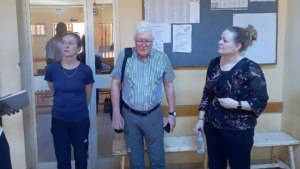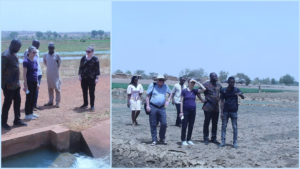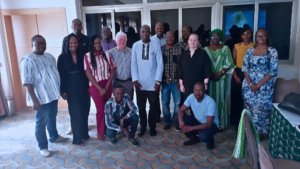CLIMSA
-
 Project Title
Project Title - Principal Investigator(s)
- Study Coordinator
- Summary
- Financial Support
- Partner(s)
- Start Date
- Probable End Date
Mitigating climate changes on health in Burkina Faso
(Acronyme : CLIMSA)
Prof Pascal Magnussen and Prof Halidou Tinto
Dr Hamidou Ilboudo
Burkina Faso has experienced significant reductions in annual rainfall and increased mean temperature most likely this is a result of climate changes. To mitigate climate change’s impact on living conditions in Burkina Faso, a number of agro-poles have been established around large man-made dams in order to increase food production and food security for the growing population. So far, the establishment of the agro-poles has been a success in the sense that food production has increased. However, local health data indicate that these environmental changes have a detrimental impact on human health, as the burden of water-related climate-sensitive diseases (such as schistosomiasis, malaria, dengue, diarrhoea) as well as water-washed diseases (scabies and trachoma) among people living in these areas are increasing. In addition, climate change impacts the distribution of vector-borne diseases by enabling the colonization of new environments by the vectors. Hence, this will affect malaria vectors but as well change the global distribution of arboviral vectors (Aedes aegypti and Ae. albopictus) responsible for the transmission of arboviruses such as dengue.
Consequently, the interactions between climate change and human pathogens in a man-made environment must be understood to ensure an acceptable balance between the need for intensive food production and the control of water-related diseases. It is therefore important to have an in-depth understanding of how local communities conceptualize, respond, and adapt to climate change and the increased disease burden are important for the planning of future interventions. The overall aim of this project is to contribute to strengthening the health of the rural population living around the agro-pole of Soum in the health district of Nanoro of Burkina Faso in the context of a rapidly changing environment, the impact of climate changes and thereby, increased risks of climate-sensitive diseases in the population. The specific objectives are (1) provide new knowledge and improved understanding of how local communities in the agro-pole Soum area respond to and conceptualize climate change and the increased burden of water related diseases; (2) identify associations between climatic, environmental, socio-economic and epidemiological factors and water related diseases in the agro-pole Soum area over the last 10 years; (3) describe and analyse the climatic/meteorological and environmental changes over the past 50 years around the agro-pole Soum area; (4) develop innovative spatial-temporal models to predict the distribution and risks of selected water-related diseases in a climate changing environment within the agro- pole Soum area; (5) formulate a set of recommendations to mitigate climate change impact on risks of water-related diseases to administrative, health and agricultural authorities in a participatory process; (6) strengthen research capacity at Burkina Faso institutions with a focus on anthropological, molecular and microbiological studies, modelling, and anchorage of knowledge in south institutions by trained master-, PhD students and Post docs. The project will be a valuable contribution toward the achievement of the national development goals in the domain of food security and population health as expressed in Burkina Faso’s national plan for social and economic development.
![]() DANIDA Fellowship Centre (DFC)
DANIDA Fellowship Centre (DFC)

University of Copenhagen (Centre for Medical Parasitology, CMP and Dept. of Anthropology)
March 2021
March 2026



